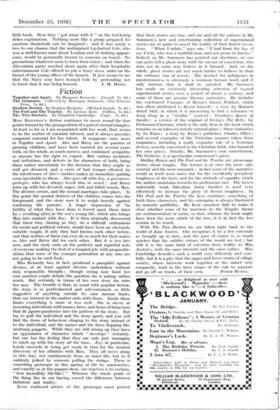Horace Cole
I ICNEW Horace de Vere Cole intimately from the time we were at Cambridge together in the early years of the centuiy. He was a man of powerful character and great assurance, of exceptional physical and mental energy, and of distinguished tastes ; and had he not been deaf and under no necessity of earning a living he might have excelled in some more recognised career than that which he adopted. His peofession of practical joking began at the age of 24 and lasted for 20 years. In that' time his exploits reached the number 61.,-00-certainly he was no idler, for he also trained himself to know good pictures and was an omnivorous reader of the best literature. In his absence one might deplore wasted talents, in his presence one had to 'confess that he kept mind and body in better repair than many who led more regular, more useful, more materially profitable lives. Towards the end he met with financial mis- fortune, was forced to change his mode of life, settled in France; but found happiness in making great expeditions on foot in the Basque country, which he loved. An artist friend lent him a house, where he lived alone without a servant. One evening the neighbours saw him enter the door singing ; the next morning he was found dead in his chair from a heart attack—he died, as he had lived, without embarrassment.
The two of his hoaxes which received at the time of their performance the greatest publicity were those in which he figured respectively as the uncle of the Sultan of Zanzibar on a trip to Cambridge and (the ' Dreadnought ' hoax) as a young gentleman from the Foreign Office accompanying the Emperor of Abyssinia on a visit to the Home Fleet. Cole Wrote his own memoirs, and they may some time attract the attention of a publisher ; but with his nice literary discrimi- nation he would, I think, have approved of the way in which the story of his two major exploits has now been told by Mr. Adrian Stephen, who was a collaborator in both.
• Mr. Stephen had a philosophy of practical joking, based on the feeling that "anyone who took up an attitude of authority over anyone else was necessarily also someone who offered a leg for everybody else to pull." We are transported into the spacious days of liberty when he tells us that, as an alternative to the hoaxing of the Mayor of Cimbridge, it was seriously considered that Cole's company should provoke an "inter- national ' incident " by disguising themselves as Prussian officers on the Franco-German frontier. The project was dropped, not for reasons of safety but on the grounds of expense! In the ' Dreadnought ' hoax the participants besides Cole and Stephen were Stephen's sister (now Mrs. Virginia Woolf), Mr. Duncan Grant,' Mr. Guy Ridley and Mr. Anthony Buxton. Their portrait in the part is given as a frontispiece to this
little book. How they "got away with it" on the battleship defies explanation. Nothing more like a group prepared for amateur theatricals can be imagined ; and it was surely a two to one chance that the undisguised top-hatted Cole, who was a well-known man about London and of striking appear- ance, would be personally known to someone on board. No precautions whatever seem to have been taken ; and when the Abyssinian party reached shore again after their hospitable entertainment Cole offered to pin a fancy dress order on the breast of the young officer of the launch. It just occurs to me that the Navy may have hoaxed Cole by pretending not
to know that it was being hoaxed. J. M. HONE.



































 Previous page
Previous page